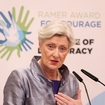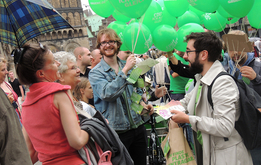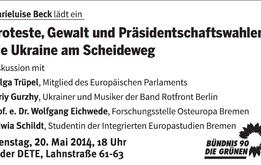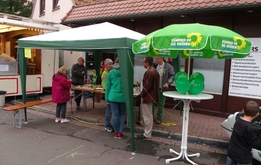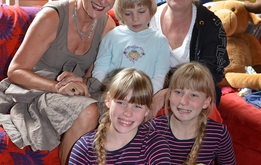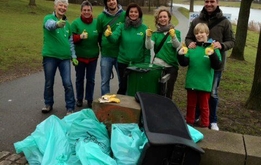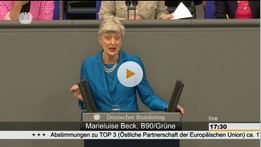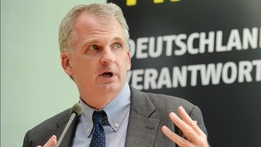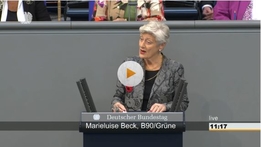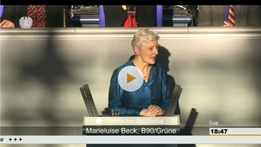16 February: Arrival in Kabul
Upon meeting me, Ms. Stilz of the DAAD (German Academic Exchange Service) was surprised that I had arrived with no one to protect or accompany me. Her remarks exposed the dilemma that visitors on protected tours to Mazar-i Sharif and Kabul see too little of development in the country.
Aside from this, journalists are more interested in sensationalism, and the steady work of rebuilding the country does not make for good headlines. There was a slight resignation in the way Ms. Stilz phrased it: "I have the impression that in Germany they always write about how much worse everything is getting, but actually it’s improving. Apparently no one wants to see the progress."
Difficult at first, the development efforts by the DAAD in Afghanistan have been coordinated with the Afghan Ministry of Education since 2007, and today work is progressing under considerably better conditions with the Afghanis accepting more responsibility. Yet, in addition to a lack of resources, education remains the major challenge. It is easier to present newly equipped computer centres and freshly paved roads than investments in education. There are very many female students and teachers. The proportionate number of women among the teaching staff is reportedly higher than in Germany presently. Statements by Malalai Joya, claiming that women had it better under the Taliban, perplex Ms. Stilz. Every two years there is a new generation of female students who display an increasing amount of self-confidence in public. Following the birth of her two children, one of Ms. Stilz’s teachers is once again working full-time. While there are female students who bow to their husbands’ wishes and drop out of studies upon marrying, an increasing number of mothers pursue a full-time job.
16-17 February: Herat
Herat is situated 130 km from the Iranian border. In addition to the majority Tajiki population, all sorts of people on questionable business move about here, including the Iranian secret service, the CIA, the German Intelligence Service, British soldiers and, of course, those profiting from widespread drug trafficking. Prostitution is securely in Chinese hands. Pitiful-looking children may be seen in the city. At the airport, which resembles a landing strip with an arrival desk, the suitcases are loaded onto carts. Two boys with pushcarts take over our luggage. We are told that they are responsible for feeding their families.
Rebuilding the university in Herat
At the airport I was met by Dr. Farangis, a former Iranian asylum-seeker who studied physics in Germany, and the dean of the university faculty of natural science. For the last two and a half years he has been building up the natural science faculty. The campus consists of a number of new buildings erected on an uncultivated field. There is still a great lack of space, and tremendous pressure is exerted by growth.
The director and teaching staff, including three female professors and junior teachers, express their gratitude for the aid from the DAAD and the World Bank in an all but embarrassing manner. There were reportedly just three students at the faculty of education when the Taliban were driven from power. Today, five years after reopening, there are 2,500. The number of university students has grown from 700 to 7,000. 100,000 young people are said to have competed for a place to study natural science last year, with this number on the rise.
My reports of the debate and uncertainty in the German population as to whether our military and civilian actions could be justified were met with incomprehension. The teachers were clearly of the opinion that the international community and their aid in schooling and education are needed, as is military protection.
After a tour of the chemistry and physics laboratories, as a display of their work, young students presented a PowerPoint presentation in the large IT hall. This facility, with about 60 brand-new computers, is the pride and joy of the university. Some of the students have already visited their partner institution, the Technical University in Berlin. They have a desire for knowledge and for keeping abreast with the contemporary world, and they are filled with hope despite scepticism about their chances in the future.
The housekeeper of a professor originally from Iran, herself responsible for feeding her family, told us in the evening that she and her husband had travelled to take part in the opium harvest in the province of Helmand when they had been in an especially desperate situation. After six weeks work she had received 1 kg of opium for pay, which she then had to sell back to the landowner for 100 US dollars. Her wage had thus been 100 US dollars for six weeks and for two people.
Health education in Herat
An American nurse, originally from Iran and having some knowledge of Farsi, is responsible for training local staff. Her training project is especially aimed at instructing women in the villages. We are told that women are currently not allowed to travel freely in the area but that men assume responsibility for training women in the villages, particularly in the treatment of children’s and women’s diseases. The child mortality rate in Afghanistan had reportedly been the highest in the world. While weak infants would be put aside at birth, sick children would oftentimes receive incorrect treatment.
Much has improved in the meantime. The child mortality rate has dropped from 257 (per 1,000 children) to 161 in the last five years, meaning that more than 100,000 children have survived each year since the Taliban pulled out.
The nurse also reported on education projects in Herat, village development programmes and an anti-tuberculosis programme. The food situation in the villages is said to be disastrous. It is only possible to work there as long as one adheres to the culture and dress requirements. For women, this means continuing to wear the tjador namas , a black veil that conceals the hair and face with the exception of the eyes and reaches down to cover even the feet. Yet the women desire freedom, even to play sports, and table tennis clubs have reportedly been opened.
The lack of education among many women continues to be a major problem. Women would often not nurse their infants in the first week but entrust them to wet nurses. This would hinder the mothers’ recovery from the effects of birth and the infants would not receive the protective benefits of mother’s milk in the first days. The eyes of newly born infants are outlined in black, formerly using coal and now with kajal, to keep away the “evil eye”. The practice leads to serious infections and even blindness. The nurse maintains that imparting basic knowledge is the most important aspect of her work. Even in the remotest of villages, families would inquire about educational opportunities for their children, including their daughters.
The repressive Taliban regime superficially provided more security than currently exists. People share their daily lives with the Taliban. They are often a part of the family and live not only in the mountains but in the cities as well. The nurse is anxious that Herat might become like Kandahar and fall under the influence of the Taliban, who oppose modernity in any form. People are afraid of the Taliban, she said. The nurse asked that funding for the work of NGOs be doubled and that international troops remain in order to allow the NGOs to continue their efforts. Without military protection it is clearly impossible to work in the region.
18 February: Kabul
Meeting with NGO representatives at the Heinrich Böll Foundation
Twelve women working for various Afghan NGOs reported on their work. The most predominant issue for women and girls is access to education. The marriage of girls well below the legal marriage age of 16 is a widespread practice. Many women suffer health problems due to their young age when giving birth, resulting in tremendous physical stress, and violence against women is also widespread. Dowries and large weddings put a tremendous financial strain on families. It is said to be almost a rule that “expensive” brides are especially prone to experience violence. After all, they cost a lot of money, thus the rationale. Attacks by mothers-in-law are reportedly as much a daily experience as those by men.
The key is said to lie in convincing parents to allow their daughters to attend school. That is the only way to protect them from violence and exploitation. President Karzai has issued a decree prohibiting violence against women but no equivalent legislation has been passed by parliament.
A currently existing law prohibits a woman from leaving her home without her husband’s permission. Another law, purportedly intended to protect the Shiite minority, requires women to be ready at all times to satisfy their husbands’ physical needs. Birth control hardly exists. Women are blamed when no sons are born, and this often leads to polygamy. There is no compulsory education for children, and, obviously none for girls. In addition, blanket coverage of access to schools is not ensured.
The women expressed their concern that the policy of reconciliation might deprive them of their rights. Women’s rights and human rights must not become an object of negotiation. The regions are said to be developing at varying rates. The share of girls attending schools in the Hazara areas is very high at 45%, and there has been progress even in Kandahar. However, the problems are especially serious in the southern provinces. These regions are ruled more by smugglers and Mafia than by tribal elders. The new offensive was necessary, the women say, but now is the time for civilian development.
Ms. Jamila Mujahid, director of the radio station "Radio Voice of Afghan Women", is putting efforts toward expanding the radio broadcasting opportunities for women. She explained that the Taliban’s ideological propaganda was being spread in the southern regions. In 2001, Ms. Mujahid was the first woman to speak on the radio after the Taliban retreated, in a speech entitled "Women, sisters, the dark days have passed".
The chairwoman of the Afghanistan Independent Human Rights Commission, a very intrepid paediatrician, described how her work was becoming increasingly restricted due to a lack of security. UN support had also weakened considerably. Her work was nonetheless well known, she stated, and frequently courageous citizens would report dramatic attacks.
The women know that they have a long road before them. They are at once impatient and realistic. They do not wish to return to the old days – and they are relying on international support. They pleaded not to be abandoned.
Government representatives
At a meeting, the representatives stated that the EU had become a weak player in Afghanistan, due to a large number of bilateral agreements by member states and to competition among them. In the face of the strong American commitment under Obama, the EU is threatened with losing even more influence.
The talks made it clear that the idea of reconciliation does not originate only with the international community and President Karzai but also with a minority amongst the Quetta Shura, i.e. the Taliban. Losses among the Taliban have been very great. They have grasped that neither side can win the struggle with military means. Besides the Taliban, the group around warlord Gulbuddin Hekmatyar still plays a role, particularly in the Pashtun enclaves in the north, yet he himself has no more influence.
In order for the policy of reconciliation to succeed, it is absolutely necessary for the Taliban to recognise that the Afghan government and the ISAF are not acting out of weakness. Increasing the number of troops from 30,000 two years ago to the current 130,000 was a prerequisite for this plan.
Yet the pivotal point in the policy of reconciliation is political cooperation between the governments of Afghanistan and Pakistan. Both sides need to grasp that it is in their mutual interest for the other country not to allow the Taliban any areas of retreat. According to the representatives, the issues in Pakistan are the lack of transparency within the distribution of political power, a government that is becoming increasingly weaker and the still unanswered question as to whether the Pakistani secret service is pursuing a policy of destabilisation against Pakistan itself. A regional approach is necessary in order for the country to achieve lasting stability. Situated between the nuclear powers of China, Pakistan, Russia and India, Afghanistan must nurture good relationships with its neighbours.
ISAF headquarters
General McChrystal has been characterised as very ambitious and serious. Assisting him as head of the civilian part of the NATO mandate is the former British ambassador Mark Sedwill. Very knowledgeable of Afghanistan, McChrystal appears highly committed, apt to think quickly and take action. He presented a blunt analysis of the past years, of the missed opportunities and the loss of valuable time. The fact that the UN has pulled out staff from an increasing number of territories for security reasons has left a vacuum in the area of civilian development. This gap needs to be closed swiftly by the ISAF and accompanying reconstruction teams in order for the population to see and feel the progress.
McChrystal accepted a strong civilian envoy for ISAF because he recognised the lack of balance between civilian and military efforts in Afghanistan. The civilian and military leaders are now working together closely. To this end, McChrystal has entrusted General Rodrigues with all of the tactical military efforts and is thus considerably freer to devote himself to strategic projects, such as good governance, building up institutions and development of the regions. In addition to troops, the Americans have brought a large number of civilian development workers into the country for these tasks, including administrative experts, agricultural advisors, technicians and engineers. The new equation is: 50% civilian development and 50% combat against insurgents, with all actions taken jointly with the Afghan army and in consultation with the government. McChrystal is said to have a strong influence on President Karzai.
Germany has doubled funding for civilian development to 240 million euros, while the US provides 1.5 billion dollars. McChrystal strongly wishes that the national contingents not entrench themselves in “their" provinces but instead cooperate across borders. The strong dominance of the Americans threatens to push the Europeans to the sidelines. This is related to the lack of a common European strategy as seen, for example, in the failure of the Europol project. Police training has displayed tremendous deficiencies overall, with more than 2,000 trainers lacking. The ISAF cannot afford any more similar mishaps – the time is too short. The UN must, of course, assume responsibility for all of these tasks in the long run. The UN must think in terms of long periods of time (at least three to five years), however, while it is now a matter of acting quickly and achieving results.
Ambassador Sedwill pointed out that the success of civilian and military efforts is inextricably linked. This was confirmed by the German government official with the ISAF. It is urgently necessary to get out into the field so that the people experience the resources reaching them. The local provincial councils need to be more strongly involved in decision-making. There must not be any more "no-go areas" and the Taliban territories must be dried up. The population must be able to rely on the assurance of security on a permanent basis, otherwise it is obviously more reasonable for people to remain under cover and prepare for a potential return of the Taliban.
Kai Eide, Special Envoy of the UN Secretary-General, got directly to the point about the need for the troop build-up. The main point was not whether territories can be conquered but rather whether they could be held, in order to provide the population with some degree of trust and security. Mr. Eide stated that his day-to-day work was marked by the concern for possible attacks. The responsibility for the staff members entrusted to him is a heavy burden.
The Americans are implementing the new strategy at a fast pace. Rapid change and success in civilian development are expected of the 22 provincial reconstruction teams (PRTs). Eide expressed concerns that the agenda for Afghanistan might be too ambitious, since 80% of the civilians are illiterate. There is also too little trained legal personnel, a fact which hampers criminal proceedings against insurgents. Eide additionally expressed scepticism as to whether the great number of major projects slated for the next year might not overtax resources. These projects include the military offensive in the south, holding a series of peace meetings and parliamentary elections.
19 February: Mazar-i Sharif
Here we visited German soldiers and the police training staff. They also praised the wise and decisive action of the US. Finally, military strategy and civilian development have been planned jointly. The approach to the south represents a blueprint for future strategies. The aim is no longer to "destroy" opponents but to protect the population. Development projects and institutional reconstruction need to follow, with the Afghans sharing and taking over responsibility. A police force, corresponding more to a lightly armed infantry and less like traffic police, must hold the territories once the army leaves.
The mission is based on four principles:
1. The promise of the international community to the Afghan people
2. Radical Islam must not be allowed to triumph and gain strength
3. Stability in the region (i.e. Pakistan) must be maintained
4. The al-Qaeda terror network must not be allowed to return
Outside of Mazar-i Sharif
Afterwards we drove – under heavy guard – into the region. Fear of unexpected bombing attacks dominates day-to-day life in the patrols. The soldiers are almost more concerned with the fear of losing limbs than of death itself. Considering the needs and tasks at hand, there are too few of us, the soldiers say. It is not reasonable for a political decision to ultimately determine the extent of the troop build-up instead of taking into account the local needs.
Visit to an Afghan camp – German soldiers as mentors
An Afghan general working closely with German soldiers insisted that it is mainly a matter of being able to provide the local people with perspective. This is the only way to bring lasting calm to the region and to convince the people to follow the government’s path. The Pashtun enclaves represent the major problem in the north. In these areas there are followers both of the Taliban and of Hekmatyar; the latter are militant and often organised in the radical Hizb-i Islami party.
There is a variety of interrelated missions: both international and Afghan military forces are found here along with various civilian organisations (UNAMA, EU, NGOs), the General noted. This shows that the aim is not to wage a war but to build a nation and to bring peace to the country.
German ISAF soldiers
The German soldiers were seen to be very perturbed by the peculiar way in which their mission is perceived in Germany. They had not been bent on going to Afghanistan but had been sent there by politicians, who had gone into hiding during the debate in German society. They do their job, borne by the will to give the Afghan people a future. The inversion of responsibility, as if the soldiers had to justify themselves for this mission instead of the politicians, leads to resentment among some soldiers, while they take upon themselves the risk of injury and death.
In the Kundus region, they come under fire by dangerous anti-tank weapons and machine guns almost every day. The mission guidelines require the German soldiers to respond with flare ammunition if there is any indication of danger to the civilian population. Yet, this must be always assumed when the fire comes from a residential area. The insurgents take advantage of this requirement by intentionally launching attacks from residential areas.
Meeting with German police trainers
The German Police Project Team (GPPT) was initiated in 2002 following the Petersberg Afghanistan Conference. The budget amounting to 40 million euros is part of the budget of the Federal Foreign Office. A multi-national project since 2006, it has been conducted through EUPOL since 2007. The number of German trainers was increased from ten to 100 in 2009, and an increase to 200 is planned for 2010. The experts stay at the training locations for only three months, however. The training locations are Mazar-i Sharif, Kundus, Feyzabad and the police academy in Kabul.
Training of 600 police officers is planned for this year at the branch of the police academy in Mazar-i Sharif. Currently, 373 officers are in training. They take part in an eight-week basic training course and then a four-week block providing specialised training. Non-commissioned officers with the police force receive training lasting four and a half months. Women are trained along with men. This is necessary, as men are not allowed to search women.
In the future, 5,000 police officers are to be trained each year in all of Afghanistan. Major challenges are the large number of trainees (102,000 police officers are targeted for 2010) and the qualifications of participants. Afghan families mostly send for training family members who contribute little to the family income. Among participants in basic training for general police service, 60% to 90% are illiterate. They are usually not familiar with weapons and often have little training. There are line-ups at the infirmary after physical exercise as the men are not familiar with muscle soreness.
Training is also done in a group in systematically overcoming obstacles. Training under such conditions is challenging. Much work is done with toy figures to make up for the lack of literacy and, in line with the culture, stories are told, often in great detail. Upon certification, police officers earn a salary of 170 dollars. By way of comparison, an interpreter in Afghanistan earns about 500 dollars. Thus, the choice to become a police officer is still a difficult one as long as there is a family to feed. When the police officers are released into service after eight weeks, they are fully equipped with several uniforms, rifles etc.
Police training is not possible without military assistance. A police mentor team consists of four civilian and four military police officers. They are usually joined by six infantrymen who are to protect the police officers, and a medical unit. Any increase in the number of police officers automatically entails a corresponding need for military staff, vehicles and equipment. The message of police and soldiers in Afghanistan to politicians is that the politicians have given them a task and must therefore accept the political responsibility for the mission.
The military police officers see themselves as well qualified with the abilities required for training in Afghanistan, both in terms of police work and military training. In view of the situation in Afghanistan, it would be very useful to send police officers with robust training behind them. Deploying more military police would, however, entail restructuring or expanding such units in Germany and reallocating resources. The military police has in the meantime become highly specialised for the most part; due to multiple obligations in Germany and abroad, it is currently not possible to dispatch many more military police officers on foreign missions without suffering limitations in other quarters.
The ultimate goal must be to train trainers. Provided with only basic knowledge, these police officers will need to receive further training later. They usually leave training merely with the ability to serve at checkpoints.
The police seek contact with the population in order to build trust. Yet, this is only possible in relatively calm areas. Aid work, i.e. distribution of water, supplies to hospitals and similar activities, is widely left to the Afghans. Major projects are contracted out and performed by organisations such as the GTZ (German Society for Technical Cooperation).
The danger to which the police officers are exposed was described in vivid terms at this site. They live in danger of attacks – in particular of frightening bombing attacks. There are also major challenges in coordinating the many participants: EUPOL, an American component, a German component and an Afghan component. There is no defined chain of command between these groups.
20 February: Kabul, reception with members of parliament
My trip came to an end with an evening at the Germany Embassy, to which about ten members of parliament had been invited. From Mujahideen to a presidential candidate of the women’s movement, they represented the great diversity within parliament. Without exception they expressed their gratitude for the aid from Germany and explicitly mentioned that the ISAF mission had a UN mandate for protection against terrorism and for human rights. The unanimous opinion was that, if the ISAF pulled out immediately, there would be even greater bloodshed than in 1992 when the Mujahideen assumed power.
Civilian reconstruction cannot take place without security. Human rights and, in particular, women's rights would be in danger.
Among the representatives, the women view the policy of reconciliation very critically. They fear a rollback on every front: in girls’ access to education, in job opportunities and in their demands to be treated as subjects and not objects in Afghan society. Before negotiations begin, the women wish to know where the red line will be drawn on human rights. They also fear the loss of the right, guaranteed by the constitution, entitling women to 25% of the seats in parliament. The fear among women is already becoming apparently so great that they no longer claim the seats in parliament to which they are entitled.
One of the members of parliament admitted to years ago fighting against the Russian occupiers. Yet today he supports the presence of the international troops. He recommended that the international community keep a watchful eye both on the Karzai government, which is not above corruption and hunger for power, as well as on the Taliban.
We also asked the member of parliament about the Mujahideen fighting the ISAF in the Pashtun territories in the north and about the likelihood of reintegrating Hekmatyar. He reckoned that Karzai would negotiate even with Hekmatyar’s Hizb-i Islami party in order to consolidate his power if international forces pulled out. As a young man in the resistance against the Soviet Union, Hekmatyar was an emotional and influential figure. Yet he has since lost most of his influence and has become tired of life as a fugitive.


